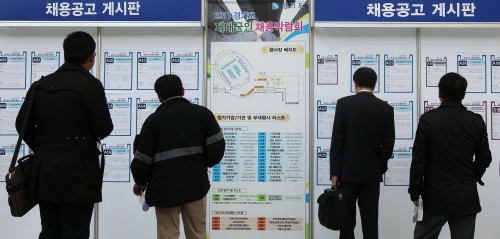Korea’s IT, construction, finance and airline industries are swamped with layoffs and job reductions as global economic uncertainties stretch out.
IT exporters have been losing money due to the recession in Europe and the U.S., while high oil prices and a weak Korean won against the dollar continue to weigh on air carriers.
Korean Air recently decided to let go of about 100 senior employees who signed up for voluntary resignations, a program brought back after five years. The outgoing middle-management staff, who are over the age of 40 and have worked for 15 years or more, will receive advance payments and education fees for their children for up to two years in addition to severance pay.
In the electronics sector, demand for television sets nosedived with the economic downswing across the world, freezing employment at display panel manufacturers.
Industry watchers forecast LG Display to post operational losses of over 900 billion won this year.
Samsung Electronics’ LCD division is expected to record operational losses as well, which will hurt over 30 suppliers of display-related parts and equipment.
“Mobile phones and semiconductors are fine, but the display panel business situation is bad. Both television makers and parts suppliers could reduce employment,” said Kim Byung-ki, an analyst at Kiwoom Securities.
Taiwanese laptop manufacturers Quanta Computer Inc. and Inventec Corp. recently announced plans to cut 1,000 and 400 jobs, respectively, and several local companies have also begun restructuring.
“The government’s trickle-down theory didn’t work in terms of employment. We expect domestic IT companies to freeze hiring like their competitors in Taiwan,” said Lim Dong-soo, policy chief of the Korean Confederation of Trade Unions.
A number of construction companies are advising workers to leave on top of receiving applications for voluntary redundancy as the property market slump drags out.
Large builders are enjoying steady overseas plant orders, but small and medium-sized companies, which relatively lack technologies and depend mostly on domestic sales, are not.
Byucksan Engineering & Construction Co., Namkwang Engineering & Construction Co., Sambu Construction Co., Hanil Engineering & Construction Co. and Sungwon Corp. have had workers voluntarily quit or plan to, according to an official at the Korean Federation of Construction Company Unions.
Builders, especially those under debt workout programs or court receivership, are expected to continue receiving applications for voluntary resignation through next year as there are no signs of recovery in the construction demand at home.
“Public civil engineering orders have also dwindled. Large builders are hiring more for overseas plant divisions, but are likely to reduce jobs related to domestic business,” said Lee Wang-sang, an analyst at Woori Investment and Securities.
Another problem is that the increase of foreign manpower on construction sites is leaving fewer jobs for Korean workers, according to Shin Kyu-beom, an analyst at Construction & Economy Research Institute of Korea.
In the financial sector, Hana Bank set up voluntary redundancy for 378 employees in exchange for 34 months’ salaries. It may go ahead with more layoffs if it succeeds in acquiring Korea Exchange Bank.
Woori Bank has told its major stakeholder Korea Deposit Insurance Corp. that it needs large-scale redundancies when its credit card business spins off early next year.
As for the seven suspended mutual savings banks scheduled for M&As, most of them will undergo major downsizing once they are acquired, according to KDIC officials. Financial authorities suspended the operation of the secondary lenders earlier this year.
By Kim So-hyun (
sophie@heraldcorp.com)







![[Herald Interview] Meet 1VERSE, first K-pop boy band to feature North Korean defectors](http://res.heraldm.com/phpwas/restmb_idxmake.php?idx=644&simg=/content/image/2024/11/27/20241127050102_0.jpg)
